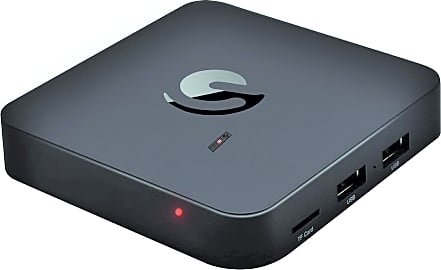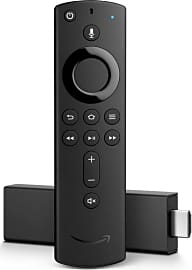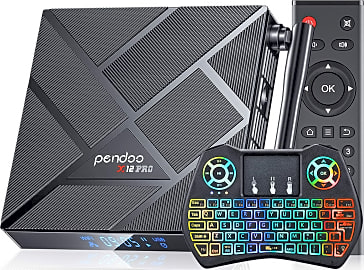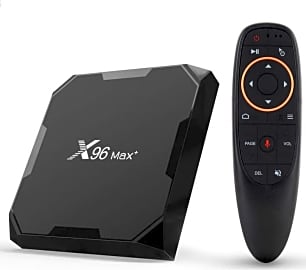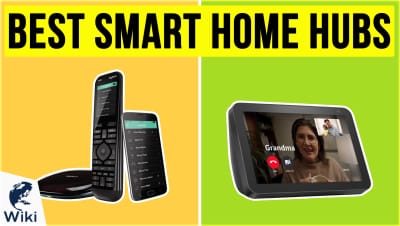The 7 Best Android TV Boxes

This wiki has been updated 37 times since it was first published in July of 2015. Ditch that expensive cable or satellite TV service and start saving hundreds every year without losing access to all your favorite games, TV shows, and movies. These Android and Linux-based boxes make it relatively painless to cut the cord by streaming all kinds of video content, often in 4K Ultra HD. We've ranked them by their speed, connectivity capabilities, storage capacity, and ease of use. When users buy our independently chosen editorial picks, we may earn commissions to help fund the Wiki.
Editor's Notes
January 25, 2021:
There's a veritable sea of set-top boxes out there, and here, we wanted to focus specifically on those that run the Android operating system, of which there are a few important variants. The Amazon Fire TV Cube and Amazon Fire TV Stick 4K run Amazon's Fire OS, which is technically a custom re-skin of Android itself, and they both have a long enough app list and the premium build quality required for recommendation.
The Pendoo X12, Supvin X96 Max+, and to a point, the CanaKit Raspberry Pi 4, are all third-party devices that aren't official, but are highly recommended for tech-savvy users. On the other end of the spectrum, the Nvidia Shield and Ematic AGT419 are two of the rare devices to run the actual, official Android TV operating system, and the Shield in particular is one of the most veratile streaming devices available today.
January 10, 2020:
A lot of the devices included on our last list have seen upgrades, including the Fire Cube, which continues to offer the best combination of features and performance, especially as a smart home hub. Some of these upgrades brough overdue 4K compatibility or updates to important video codes, while others were a little more aesthetic. The Dolamee F2 Media Player, took the company's previous model and put it in a more breathable housing to keep it from overheating. They also added a clock display on the front for extra convenience.
We sent off a couple of outdated models, as well, many of which shipped with older versions of the Android OS, like the Pendoo TX3 Mini, which also suffered from some availability issues. The new additions to our list include Ever Express Q Plus, which actually boasts 6K compatibility, and the SeekEdge Mini, which is a somewhat underpowered budget option, but not a bad place to start for occasional users.
January 22, 2019:
There are many things to consider when selecting the best Android TV boxes. First and foremost, they must offer a stable internet connection, because nothing else matters if is always buffering or disconnecting when trying to stream a video. After that, we tried to balance features like storage space, ease of use, external device compatibility, housing style, user interface design, and hardware specs.
The Androids Are Among Us
The alternatives run customized version of the Android Open Source Project, which is considerably more flexible than the closely tailored Android TV platform.
In the age of cord cutting, old fashioned cable boxes couldn't be less popular. The boxes themselves have always been a pain, causing additional rental fees to consumers and coming loaded with inexplicable bugs. Now, even the big cable companies like Charter and Comcast are offering their customers streaming-only viewing options that have long been favored by users of third-party streaming boxes.
Despite the popularity and simple operation of devices like Roku, Apple TV, and their ilk, more and more Android TV boxes keep cropping up around the market. The demand is understandable; those more popular TV boxes are closed platforms where the Android boxes allow you to make all kinds of alterations to customize your experience. It's rather akin to the argument between users of Android phones and their Apple equivalents.
It's important to note how the different boxes each utilize the Android operating system. Technically speaking, Android TV is a specialized version of the software, licensed specifically by Google to manufacturers of particular devices. Beginning in 2015, a number of major television brands began to ship with official Android TV integration. In addition, several service providers offer proprietary hardware fashioned around the official operating system. By comparison to those devices, there are relatively few standalone TV boxes that utilize the Google-licensed software. The alternatives run customized version of the Android Open Source Project, which is considerably more flexible than the closely tailored Android TV platform.
The functional differences between the two are pretty noticeable, despite having related source code. The official platform receives constant updates directly from Google, ensuring a smooth and hassle-free user experience. Some say that the various functions of Android TV “just work,” and to a large extent, that's true, because the official package is often installed on somewhat reputable products that Google has vetted and deemed appropriately configured. On the other hand, there is much more variety on the open-source market, and because there are no licensing fees or expensive research and development, models running AOSP tend to be far less expensive. However, due to their unregulated nature, an open-source box is more likely to underperform, as unscrupulous manufacturers may use underpowered hardware in order to cut costs. And because of the OS's customizable nature, some companies block access to their competitors' apps through the boxes. Pay attention to what version of Android each box uses, because some ship with relatively old and unsecured operating systems, and they may or may not accept a software upgrade. It's also wise to keep a close eye on updates for third-party Android boxes, as a simple security hotfix can be the difference between internet privacy and identity theft.
One of the greatest benefits of a streaming box is that you can quickly and easily install Kodi from the Google Playstore, even with very limited tech knowledge. Sure, you can install Kodi on the Roku and Apple TV, but the installation process can be somewhat tricky and, more than likely, you'll have to find an online instructional to guide you through it step by step. Even then, many might falter along the way. With the majority of the Android TV boxes on our list, it's as easy as installing an app on your Android phone.
If you aren't familiar with using one of these devices, you may be wondering why Kodi is so important that it would make you want to buy a device that allows for easy installation as opposed to purchasing a name brand with which you are more familiar. It's simple: Kodi is the main application that most people use when streaming media. For the controversial practice of streaming licensed media content without paying for it, which does have legality issues, Kodi is the go-to software. But the truth is, there are many perfectly legal streams available through Kodi, both paid and free of charge. With that said, if you're in a locale or on a network where even everyday entertainment media is restricted, or if you just have a healthy sense of paranoia, you may want to consider routing your connection through a virtual private network. A VPN is a high-speed proxy server that masks and anonymizes all of its throughput, keeping prying eyes from peeking at your TV habits, or worse, your personal data and location. For those who aren't very tech savvy, it isn't worth taking the chance on buying a closed platform where you will have to side load Kodi, because if you cannot figure it out, you are left only using the limited number of streaming services that your platform is compatible with.
In addition to streaming movies and TV shows, Kodi has a huge library of add-ons that let you to customize its abilities. You can install gaming add-ons to turn your box into a retro gaming console, weather add-ons that keep you abreast of weather conditions in your area, picture viewing add-ons that turn your TV into a slideshow of your favorite photos, and more. The possibilities are nearly endless.
Another convenient thing about these devices is that they also bring a fully functional internet browser to your television, pairing with wireless keyboards and mouses to give you a full computing experience in the middle of your entertainment center. This means you'll be able to check your Facebook or e-mail account without having to pull out your phone or laptop. Some even allow you to install Skype and use your TV for video chatting when you add a webcam to the setup.
What's In The Box?
Looking at Android TV boxes in a lineup, you might be hard-pressed to figure out which of them packs the most punch, unless you know what you're looking for when you crack one open.
If you do know what you're looking at in there, you'll begin to see some of the more important differences among these boxes, like the processors they're using or what version of Android a given box can support. The key here is picking the best system for future-proofing, especially as 4K compatibility becomes more important.
Rather than the x86 architecture that makes up PC processors, Android is written to run on ARM chips like the ones that drive smartphones and tablets. This limits how much electricity the unit draws and the heat it puts off, although ARM chipsets can struggle with high-volume data processing. Unfortunately, a lot of Android boxes use yesterday's processing capabilities to keep their prices low, especially since they're primarily uni-taskers, only needing to run one operation at a time. Still, 4K demands a lot of processing power, and a box outfitted to smoothly stream up to 1080 only will be obsolete faster than one equipped to handle the 4K revolution. Make sure that your chosen model has an up-to-date processor and accompanying GPU, as well as enough RAM for the interface to run smoothly. Two gigabytes is the bare minimum, and it's worthwhile to look for a box with 4 gigabytes.
Make sure that your chosen model has an up-to-date processor and accompanying GPU, as well as enough RAM for the interface to run smoothly.
And while they don't pack the punch of a desktop PC, these are still high-functioning, standalone computers in their own right. In that vein, many offer USB as well as Bluetooth connectivity, thus serving as a versatile hub that can not only deliver new content, but also help you enjoy your existing media collection. Certain selections feature high-powered Wi-Fi antennae, as well, with some supporting protocols as powerful as 802.11AC. Additionally, dual-band capability is an important consideration if you live in an apartment or otherwise nearby a lot of networks; the ability to switch to the lowest-interference channel will help prevent your streams from skipping or stuttering. Some of the most advanced units can function as smart home hubs, unifying all of your modern appliances with your entertainment system.
And even though it's mostly fallen off the map, some models still support 3D playback on compatible televisions. While there aren't a ton of 3D titles available, there are still some that are visually breathtaking and well worth the added depth.
In addition to the ability to effectively handle visual media, there are other specs or capabilities one should look for in an Android TV box. If you plan on using it with a surround sound system, then you should purchase a model that offers a 5.1 audio passthrough, in the form of either an optical plug or the more common SPDIF output. This allows your device to pass the sound signal from the media source straight through to your TV or surround sound system without altering it in any way, resulting in significantly better sound quality. Some devices even support advanced sound profiles such as Dolby Digital audio.
H.265 hardware decoding, sometimes written as HEVC, will come in handy over the years as the average size of video files gets larger and larger. The H.265 codec is extremely technical, but in a nutshell, it makes your device more efficient when decoding large video files so you get high image quality with little to no lag time and without straining your device's hardware. It will also help your device support 8K video as it makes its way into the mainstream. It's also integral in transmitting true 10-bit Ultra-HD color to the TV, which is a core requirement of the burgeoning HDR standards, HDR10 and Dolby Vision.
Over-the-air updating, or OTA, is also a convenient feature to have. This is basically an app that makes your Android TV box check for updates periodically and, if they are available, automatically install them so you don't have to worry about manually updating the firmware, because it's hard to overstate how important security is today.
Android boxes often require a mouse to navigate the user interface, so a box that comes with a wireless mouse — or better yet a mouse and a keyboard — will generally be a smart choice, otherwise you may have to lay out additional money to purchase these items separately. When looking at the cost of the models you have in mind, consider whether they come with all of the external devices that you will need. If not, make sure to add that into the estimated cost to help you determine if a particular unit really fits into your budget. If you're adding streaming functionality with an eye on video games, you're in luck. Not only are many models compatible with a range of controllers, many also allow you to use your phone as a touch-ready peripheral, although this solution is mostly for casual gaming.
Finally, you might want to take style into account when making their purchase decision. While it should not be the deciding factor, it is worth mentioning that there is a certain degree of style to the design of a lot of these boxes and, considering that they are more than likely going to become a centerpiece in your entertainment area, you may want to buy one that you enjoy looking at.
TV On The Internet...in The 90s?
When I was a kid, just as everyone was getting their hands on these increasingly ubiquitous AOL starter discs, a friend of mine had his parents acquire a strange device called WebTV. It was a Microsoft product that connected your telephone's internet signal through a crude computer box that displayed a browser window on your television screen. My friends and I used it for studious research into human anatomy.
That was in the late 1990s, and just before the turn of the millennium, even after Microsoft has stopped selling the device, their user numbers grew to nearly 800,000. There was a demand, but the tech was still struggling to rise to the wants of the consumer.
TIVO showed up after that, introducing for the first time a sense that you didn't have to be in your home in front of your TV at a given moment to watch your favorite shows. Suddenly, Nielsen ratings began to lose their relevance like an old Vegas crooner at the dawn of Rock 'n Roll.
Even the ever-present DVD and later Blu-ray disc started to slowly disappear from entertainment center shelves.
Apple dropped their first TV device in 2007, though it took until January of 2008 for a software update to allow it to run autonomously, disconnected from any other Apple device. The first generation Roku boxes appeared soon after that in 2008, and they were billed as Netflix devices before anything else. As technology streamlined and tailored each user's experience, people started to consume media at their preferred rate, no longer tied to the TV Guide. Even the ever-present DVD and later Blu-ray disc started to slowly disappear from entertainment center shelves. Independent streaming platforms began to use their entertainment clout to produce original content, leading to an incredible variety of creative, new shows all vying for screen time. Websites that used to mostly stream cartoons were suddenly backing full-fledged feature films, an end-run around the high entry barriers of the movie industry.
TV studios took notice of the trends, and began desperately trying new ways to get people to watch their shows while they aired, as the industry was still desperately clinging to their on-air ratings numbers to sell advertising spots. They even joined forces with Twitter and had their shows' stars live-tweet with fans exclusively during live broadcasts. The irony there, of course, is that most of the live-tweeting took place during commercial breaks, diverting attention away from the very ads for which they were trying to sell spots.
Now, Android TV boxes have come to tempt a significant amount of the market toward a more customized experience, and a full complement of the latest games, apps, and features. In fact, broadcast television seems, in some ways, to be headed the way of print newspapers, toward the annals of media history. These streaming boxes are more useful than ever because even major broadcast organizations such as CBS and Fox are fully embracing the internet, and trying to get ahead of the market so they can still reap advertising revenue. So, there's certainly no worry that cutting the cord and switching permanently to Android TV will keep you from your favorite episode of The Simpsons. In particular, those who travel frequently or enjoy a lot of foreign shows will really appreciate the huge range of entertainment these products offer. Again, you may need to employ a proxy or VPN to make it look like you're in Great Britain, but once you do that, watching Wimbledon is a breeze.
It can be hard to keep up with the constant introduction of fresh standards and new hardware, but the fact is that streaming is here to stay. The ability to step away from greedy, faceless cable companies and only consume the media that we want to makes life that much simpler and more affordable, and the right Android TV box can help shed those steep monthly bills.


